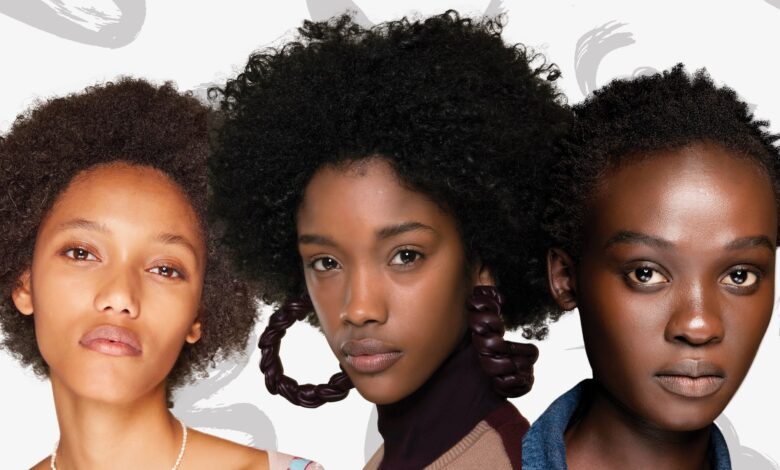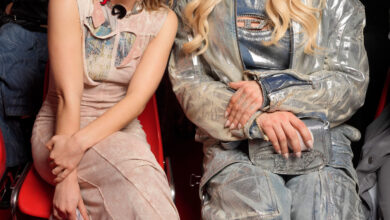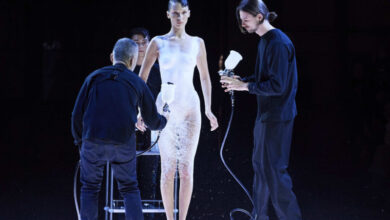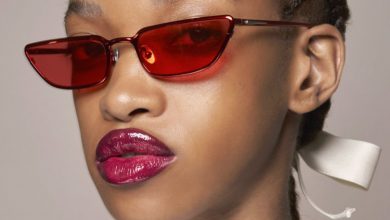6 Pro-Approved Natural Hair Tips You Need to Know

[ad_1]
This is Texture Talk, a weekly column that deep dives into the dynamic world of curly hair, from crowns of curls that are free flowing to strands that are tucked away in a protective style.
With its continuous stay-at-home orders keeping us in a steady holding pattern over the past several months, the pandemic has seen many women of colour with afro-textured hair leave their regular relaxer treatments and weaves behind and embrace their natural curls and coils.
If you’re new to the natural hair game, crafting a hair routine that will help your spirals achieve their utmost potential in terms of health and curl definition can feel like a (literal) handful. But don’t fret; we’re here to help. Ahead, we spoke with Toronto-based hairstylist and Maui Moisture brand ambassador Janet Jackson for some of the top natural hair tips she gives her own clients embarking on natural hair journeys so that your mane can thrive this winter and beyond. And for those who are not newly natural, this article is a great reminder and reference.

Reach for deep conditioners, especially right now
Rocking free-flowing curls during the winter means keeping up with regular deep conditioning treatments, which can drastically help strengthen curls. “This time of the year, natural hair is a lot more dry and brittle and can break because of that. I suggest using a hair mask once every two weeks — minimum once a month — especially now,” says Jackson, who recommends picking up Maui Moisture’s Revive & Hydrate + Shea Butter Hair Mask for tighter coils. “What’s really nice about this one is that you can also use a little bit as a leave-in treatment if your hair feels like it needs more hydration or slippage for styling,” she adds.

Incorporate a deep cleanse every once and a while
When it comes to washing curls, which are naturally drier, less is definitely more: Many hairstylists recommend only lathering up with a gentle, non-oil stripping hydrating shampoo once a week to every two weeks, especially for thicker spirals, and, if needed, rinsing with conditioner in between instead. But achieving ample curl definition often relies on the layering of different styling products, like leave-in conditioners, gels and curl butters, which over time will inevitably create build-up on the scalp that your regular go-to cleanser likely won’t be able to remove, even with the most diligent shampooing. This product build-up can clog pores and weigh your curls down, says Jackson, adding that after a while curls will become limp and lifeless and unable to hold a style. “Because of that build-up sitting there, your hair won’t respond to treatments and to curling products.” None of us want that, so to properly freshen up your tresses, Jackson recommends implementing a good clarifying shampoo that’s designed to remove the build-up that regular shampoos don’t into your routine at minimum twice a year. If you’re one who layers a ton of different products into your hair on the regular, up that usage to once a month.

Detangle in sections
Detangling your spirals in the shower while they’re well-coated with a hydrating conditioner is an ideal curly-girl strategy to avoid breakage, and whether you’re using your fingers or a wide-tooth comb to work through knots, “understand the importance of detangling in sections,” says Jackson. “That’s huge for textured hair.” With natural hair tending to be on the thicker side, working in sections (note: always begin detangling at the ends of your hair and working your way up) really allows you to get down to each knot. Sectioning is also a game-changer when it comes to ensuring a thorough product application, especially when applying curl-defining products, notes Jackson. “Sectioning is key when it comes to great definition,” she says.
For the best curl definition, play around with trusted techniques
When you’re blessed with natural hair, you’re often dealing with various curl patterns
on one head of hair, meaning that uniform definition and bounce post-shower — even with the help of styling products — isn’t guaranteed. And the tighter your natural hair is, the less distinct your curls will be, even when the hair is in a wet state. So if you’re seeking an extremely defined and looser curl look, try testing out some tried-and-true curl defining techniques on natural hair that’s been freshly shampooed and conditioned, suggests Jackson. Now, we’re not going to lie: these techniques can be time consuming. But the best part is that the style results can last up to a week with the proper maintenance.
Popular techniques to define and stretch out coils include finger coiling, which, just as it sounds, requires taking small sections of hair, adding some product and twirling the strands around your finger to help form and hold a uniform spiral. Once one spiral is created, move on to the next section.

Another fave, especially for elongating the look of kinky coils, are two-strand twists outs. The method requires grabbing a small section of hair, finger combing it, applying a styling product, separating the section into two and twisting those parts around one another like a rope until you’ve reach the ends. Allow the twists to set overnight and unravel them the next day to reveal a wavier pattern throughout your mane.
Jackson also recommends the shingling method, which starts with separating the hair into four sections and applying leave-in conditioner evenly to each by finger-raking it through from root to tip. Next, using your thumb and index finger, a curling cream or gel is applied and smoothed over individual curl strands within each section. Once you’re sure hair is well-saturated with your styling product, move on to the next sections.
For each method above, continuously working on wet hair is key, so keep a spray bottle near by and spritz hair whenever necessary to keep it nice and damp. To help with all that sectioning, opt for plastic clips to keep parts separated and to hold hair out of the way. Most importantly, don’t touch. After completing a technique, leave your hair alone so it can dry thoroughly without any disturbance.
Make the most of your curly hairstyle
After going through all that detangling and styling on wash day, nothing is more frustrating than going to bed with a head of beautifully styled curls, only to wake up to a flat, ruffled head of hair. A trusty hair bonnet, which works to reduce friction and retain moisture while you get your Zzz’s, is an essential for preserving your natural hairstyle or curls, says Jackson, adding that trading in your regular pillowcase for a satin or silk option is also great for avoiding dried out strands and hair snags. If day-two hair is in need of a refresh, Jackson recommends giving it a spritz with a curl refreshing spray. “If you don’t have a refreshing spray, you can put a little bit of your favourite conditioner in a spray bottle with water and shake it up,” she says.

Most importantly, don’t hate on frizz
When you’re used to sleek hairstyles, frizz has a really bad rap. But when rocking natural hair, stop trying to wrestle with nature. “One thing that is very important and that I’ve been stressing a lot lately is embracing frizz. It’s part of textured hair’s DNA,” says Jackson. “If you’re always trying to get rid of it, you’re not going to get the styling results that you’re looking for.”
[ad_2]
Source link






